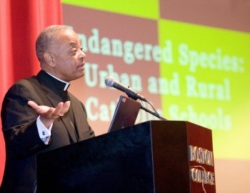SPICE summit addresses challenges of Catholic schools
BOSTON — The theme for the 11th annual Selected Programs for Improving Catholic Education (SPICE) Summit, “Endangered Species: Urban and Rural Catholic Schools” held June 23-24 at Boston College was inspired by a statement of the United States Conference of Catholic Bishops on the document “Renewing our Commitment to Catholic Elementary and Secondary Schools in the Third Millennium.”
“Young people of the third millennium must be a source of energy and leadership in our Church and our nation. Therefore, we must provide young people with an academically rigorous and doctrinally sound program of education and faith formation designed to strengthen their union with Christ and His Church,” said the statement. The document, approved by the full body of U.S. Catholic bishops at their June 2005 meeting, went on to say that Catholic schools are the Church’s best opportunity to educate young people about the faith. It also outlined challenges facing Catholic schools as well as goals for their improvement and renewal.
The summit is held annually at BC and organized by the school in collaboration with the National Catholic Educational Association (NCEA). It is aimed at providing assistance to Catholic school administrators and staff by showcasing effective programs in place at Catholic schools nationwide.
The summit, sponsored by the USCCB for the first time this year, had more attendees — about 120 Catholic school teachers, principals and superintendents in all — than any other year.
Father Joseph M. O’Keefe, dean of BC’s Lynch School of Education, said the summit brought to light many challenges facing Catholic schools and sobering news about the number of schools that have closed.
But speakers at the summit’s sessions brought helpful information forward about new initiatives focused on improving Catholic schools. These initiatives include restructuring school systems to meet changing demographics and finding new ways to raise funds, he added.
Father O’Keefe said that the hope for Catholic schools was summed up by the testimony of Atlanta Archbishop Wilton D. Gregory, who was once a non-Catholic student in a Catholic school but was led to enter the Church through his education.
“It brought home the great treasure that these schools are and how important these schools can be in the lives of kids,” Father O’Keefe said.
Archbishop Gregory, former president of the USCCB, encouraged those present to continue to educate the poor.
“As one who was once an inner-city kid in a Catholic school, I hope you continue to invite my colleagues who sit in those desks today to believe in Christ, to believe in the future, and to believe in themselves,” he said.
Schools play a critical role in the Church’s duty to model the person of Jesus Christ, to teach the Gospel and evangelize our culture, he added.
“I want those Catholic schools to be available, accessible and affordable to as many children as possible both today and tomorrow, whether they are Catholic or not,” he said.
In order to do that, Catholic schools must respond to school closings in urban centers like Chicago, where he grew up, where the Catholics have moved but the schools have not. Chicago has recently developed a detailed plan to renew schools that involves building new schools in strategic locations and marketing those schools as viable, accessible and affordable, he added.
Schools and parishes face the additional challenge of the decline in weekly Mass attendance, which negatively impacts the number of children receiving religious education. The Church needs to impress on parents that they should pass on the most important treasure they have, their Catholic faith, Archbishop Gregory said.
These challenges ought to be viewed as possibilities for growth and improvement, he added.
He encouraged those at the summit, saying “Walk forward with faith and courage because you are all part of a great ministry. Our Catholic schools do wonderful things for our young people.”
Bishop Robert J. McManus, the bishop of the Diocese of Worcester and chair of the USCCB’s committee on education, also spoke at the summit, saying that its theme was both timely and important.
The bishop’s statement on Catholic schools asks the committee on education to collaborate with other groups to develop procedures to implement the statement’s goals, collaborate with the NCEA on a strategic plan, and review the status of Catholic schools, he said.
The cooperation and collaboration of BC, the NCEA and the USCCB on the SPICE summit is exactly what the bishop’s statement calls for, he said.
Bishop McManus added that the wider Catholic community should have access to and understand the importance of the statement so that it will lead to a broader discussion of Catholic school education. More people involved will lead to a greater sharing of the Church’s collective wisdom, he said.
“That insight is going to be crucial in the success of the implementation of the document to have the entire Catholic community realize that they have a vested interest, indeed they have a responsibility, for supporting Catholic school education in our diocese,” he said.
<



















